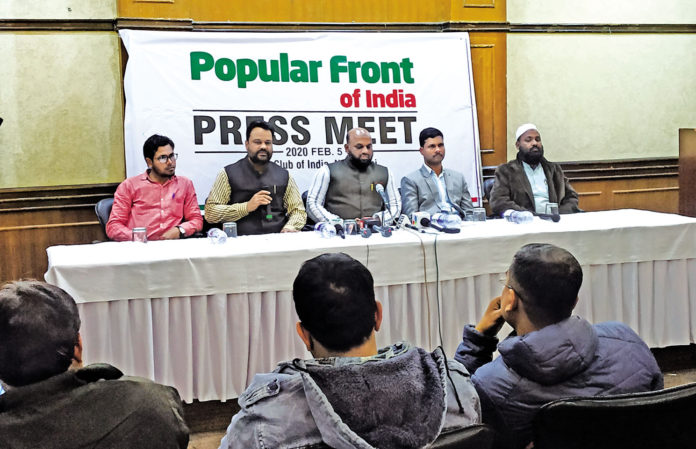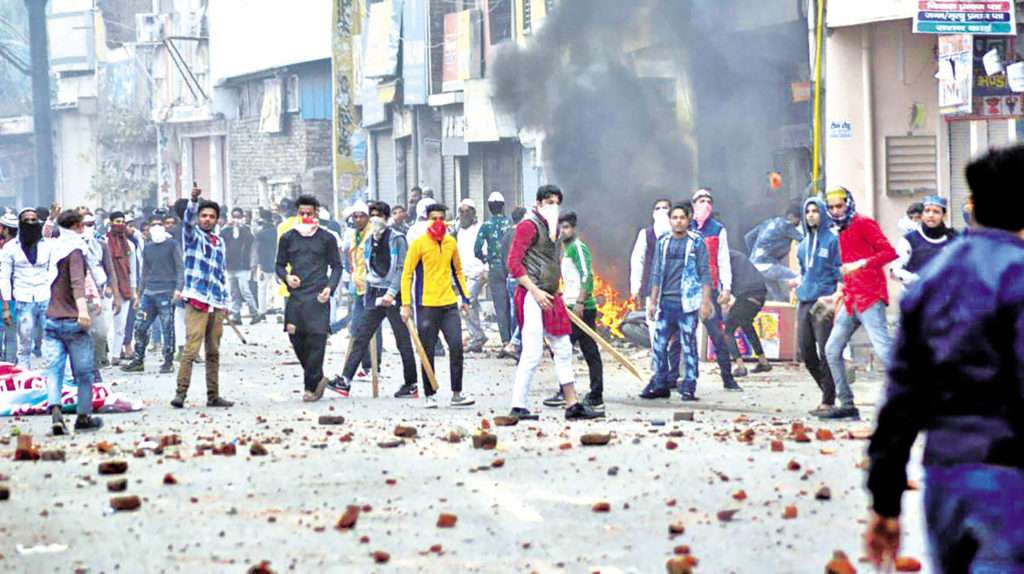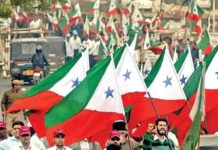
A dossier put together by the Ministry of Home Affairs (MHA) has clearly indicted the Popular Front of India (PFI), for its alleged role in anti-Citizenship Amendment Act (CAA) protests. It has alleged that it has been receiving considerable funding through its various affiliations in the UAE, Saudi Arabia, Bahrain, Kuwait, Qatar and Oman.
According to the dossier, the PFI had been actively operating through its various front affiliations such as Rehab Foundation, the Indian Social Forum and Indian Fraternity Forum. These organisations are suspected of propagating Islamic fundamentalism and have known to have raised funds in Dubai to be sent to PFI in India.
“The Indian Fraternity Forum in Bahrain, UAE, Kuwait and Saudi Arabia is also involved in raising funds for it” it was stated in the dossier.
A newspaper quoted a government official involved, who alleged that “Senior PFI leaders visit these countries and urge members to facilitate in jobs to Indian Muslims so that the base of the organisation expands along with the funds flow”. The dossier concluded a large network has been established by the PFI “with at least 80,000 cadres and a presence in 24 Indian states.”
Since the arrest of 25 PFI members by the UP police, on 19 December 2019, for their active role in stirring violence in anti-CAA protests, a call for a ban on the organization has been initiated.
In another case, the Lisari Gate police in Meerut arrested Anees Khalifa, a PFI member. He was accused for inciting violence during the anti-CAA protests in UP on 20 December 2019.Anees Khalifa was arrested for opening fire on the police and for supplying weapons and ammunition to the participants of the protest.
The Union Law Minister, Ravi Shankar Prasad, claimed the possibility of active presence of PFI in the violence surrounding the anti-CAA protests and said that his ministry would consider taking action against the organisation based on evidence. He also highlighted the links between the PFI and the banned Student Islamic Movement of India (SIMI). Mohsin Raza, UP Minister of state for minority welfare also released a statement accusing PFI of misleading the Muslim youths and for spreading Islamic radicalisation in India. He, too, refereed to PFI as a “front for SIMI” and claimed that the organisation “received its funding from Pakistan’s intelligence wing ISI”.
With the tumultuous situation in UP after the declaration of CAA, the UP government sought a ban on PFI with the home ministry. This was followed by the governments of Assam and Karnataka as well. Delhi’s Lt Governor Anil Baijal permitted the Delhi Police to detain people under the NSA (National Security Act, 1980) from 19 January 2020 to April 18, 2020. The National Executive Council of PFI condemned his order to impose National Security Act (NSA) in Delhi, calling it a “draconian law” which “legalizes denial of Constitutional rights in the name of national security”. PFI claimed the order to be a desperate action to contain the anti-CAA protests in areas such as Jamia Millia Islamia, Jama Masjid, Shaheen Bagh and Jantar Mantar.
PFI and its functionaries are infamously known for their extremist and militant activities based on the narrative of Islam. They openly profess their purpose is to “Establish an egalitarian society in which freedom and justice is enjoyed by all”. The mission statement itself raises many questions about the PFI, given that they are inhibitors of anti-CAA protests, where the slogans of “Azadi, Bharat tere tukde honge” and the threats of “raktabhan kataaron se katana” for those who oppose them, has proved to be in contradiction to its own claimed purpose.
Affiliations and Network
Since its formation, the goal of the front was clear – to exercise inordinate influence using the channel of human rights movements and protests by aligning itself with civil rights groups and various minority groups to gain the popular demographic acknowledgment.
The organisation has freely advocated its anti-Imperialist and anti-Zionist ideologies, which were seen in the pro-Palestine protests in various parts of the country in November 2012. Later, in 2014, they fashioned the campaign “I am Gaza.” In 2015, the Popular Front also protested against the capital punishment given to an elected leader, Mohamed Morsi and his followers in front of the Egyptian embassy in New Delhi. It is evident that the PFI has aspired to gain networks and influence nationally and internationally with the several campaigns and activities it has undertaken and which are not limited to Indian matters.
Through its founder E. Abubacker, PFI has managed to build a pan-India network. He was the founder President of Social Democratic Party of India (SDPI), Founder Chairman of National Development Front (NDF), part of the All India Milli Council (2005), State President for Students Islamic Movement of India (1982), founding Member of All India Muslim Personal Law Board and Managing Editor for Thejas Daily newspaper and India Next Hindi magazine.
The organization was born as a successor to the NDF in 2006 in Kerala. It strengthened its multi-state dimensional influence by merging with Manitha Neethi Pasarai, Karnataka Forum for Dignity and many other similar ideology-based organisations. Retired Lt Gen PC Katoch has pointed out the existing link between the PFI and Pakistan’s ISI network. In his article “PFI to The Fore”, he highlighted the Assam riots in 2012, which were triggered due to the hate campaign launched in South India against the people of the North East. The happening was linked to the affiliates of Manita Neeti Pasaraj and Karnataka Forum for Dignity. There was a large exchange of messages, which were also uploaded from Pakistan simultaneously.
By 2009, it merged with Goa’s Citizen’s Forum, Rajasthan’s Community Social and Educational Society, West Bengal’s Nagarik Adhikar Suraksha Samiti, Manipur’s Lilong Social Forum and Andhra Pradesh’s Association of Social Justice. PFI has built a network of sister affiliations such as Rehab India Foundation, Indian Fraternity Forum, Confederation of Muslim Institutions in India, Muslim Relief Network (MRN) and Sathya Sarini. These auxiliary branches operate as the front groups, which collect the funds internationally. The group, while maintaining its image as a non-profit organisation, also claimed to have strong ties with the National Confederation of Human Rights Organisations.
Along similar lines as Mishra Commission (National Commission for Religious and Linguistic Minorities), PFI claims it addresses the discrimination and the inequality faced by Muslims in India. In the past, PFI has conducted many protests against the use of Unlawful Activities (Prevention) Act [UAPA] to detain citizens they considered innocent.
Apart from the internal radicalisation permeating from areas of the south, the growing influence of ISIS, AL Qaeda and ISI-LeT must also be monitored in Malidives and Sri Lanka, given its close proximity to India and the ties these groups share with PFI.
Connection with Khalistanis
PFI’s deep connection and vested interest in forming a Sikh- Muslim communal alliance is now being reflected in the call for Khalistani Referendum 2020.
The Front (along with its Khalistani alliance partner) has jointly acted on matters such as the Anti-Sikh riots in 1982 and Babri Masjid demolition of 1992. There has been a symbiotic relation of the PFI-Sikh alliance which has been also seen post the abrogation of Article 370 in Jammu & Kashmir (J&K) and post CAA promulgation. With the anti-CAA protests erupting in the country, the call for Khalistan referendum 2020 has also simultaneously been pushed at the precise moment. Various online applications have found their way into Google store such as Punjab Referendum 2020, Register to Vote 2020 Khalistan and Justice for Sikhs. What is intriguing is that the timing of the launch of the applications coincides with the civil unrest conducted by the anti-CAA lobbies in which the PFI is involved. Also to be noted, the apps on registration provides a strict warning to the applicant, dissuading the registration if the person is a part of the NIA, RAW, CBI or any other Intelligence Agency of India.
Regardless of the Muslim-Khalistani alliance promoted by the PFI, it is intriguing to note how two communal groups would commence parallel plays at the specific time when the country faces turmoil in face of violent anti-CAA protests.
Past Anti-National Activities
Apart from the reputation the PFI tries to maintain, it has been accused of various notorious, anarchist and anti-national activities. Since its inception it is has been accused of having links with certain Islamic terror outfits, possessing arms, running kidnapping rackets, murders, promoting Love Jihad, funding and organising riots against the government, promotion of hate speech against the non-Muslims and for various other religious extremist activities. The PFI is well known for running Da`wa centres as well, which focuson the forced conversions of non-Muslims to Islam as reported by the NIA. It is believed to have a strong connection with Sathya Sarini in Malapurram, which has been carrying the “forced conversions.”
In 2010, the members of the Front were linked with the brutal assault on Prof. TJ Joseph, who published a controversial paper, supposedly insulting the Prophet Muhammad. The charges were denied by the organisation, which further claimed to be fabricated as a ploy to malign the name of the organisation.
The Front has centres which ply as efficient cogs in a “well-oiled machinery”, consisting of squads, experts in bomb makings and IEDS and intelligence units. These centres are known to provide martial arts training to its members and to also conduct special training in indoctrination.
In 2012, the Government of Kerala in its argument to ban PFI`s Independence Day programme “Freedom Parade” notified the KeralaHigh Court that PFI was “a resurrection of the banned outfit Students Islamic Movement of India (SIMI) in another form.” Even though the High Court dismissed the Government’s stand, the ban was imposed by the State Government. In July 2010, the Kerala Police had recovered improvised explosive devices (IED), arms, CDs and documents containing Taliban and Al-Qaeda propagandafrom PFI activists. PFI, in its defence, regarded these raids by the police as “undemocratic” and “unconstitutional.” However, in raids conducted by the Kerala police on the PFI centres in North Kerala in April 2013, the police seized “lethal weapons, foreign currency, human shooting targets, bombs, explosive raw materials, gunpowder, swords, among other things”. The Kerala Police believed that the recovered evidence would be sufficient to unmask the “terror face” of the PFI.
Based on the reports shared by Intelligence agencies, PFI was involved in the 2011 Mumbai bombings, 2012 Pune bombings and 2013 Hyderabad blasts. These claims have been denied by the PFI.
In a video release of a PFI representative in an anti-CAA gathering in Calicut, the leader of the Front was heard saying “we will decide whether there should be peace in India or not.”
Social Democratic Party of India (SDPI),a political wing of the PFI has already garnered a significant following in Kerala, Tamil Nadu and Karnataka. On the basis of the PFI’s campaign to provide “total empowerment” for Muslims, Dalits, Adivasis and other Hindu Backward classes, many organisations such as the Bhim Army have extended support to PFI.
While several law enforcement, intelligence agencies and state governments are in unison about the proscription of the PFI, the counter threats have come from Asom United Democratic Front (AUDF), Maulana Badruddin Ajmal, who have declared solidarity with the PFI. It is not surprising that many smaller groups and PFI affiliations have acted in solidarity with the PFI, condemning any action taken by the government to limit their propaganda.
With the cyber and psychological war waged against India by ISI and its coordinated affiliates, it is surprising that the call to ban PFI had not come sooner. The cadre strength of the PFI has not been precisely determined but it is certain that it is expanding. South India has become a hot bed for terror infestations from the land and sea borders.
India must deal firmly with PFI and it’s affiliates with a heavy hand and proscribe the organisation as a terror outfit, given the accelerated growth of a pan-India PFI and its affiliates. It seems to be part of a sinister programme of destabilisation in India and is trying to rope in all disgruntled elements within the Leftists, Khalistanis and Dalits to create a coalition of anti-national forces.



















[…] ALSO READ: Internal Security : A Call for Banning the Popular Front of India […]